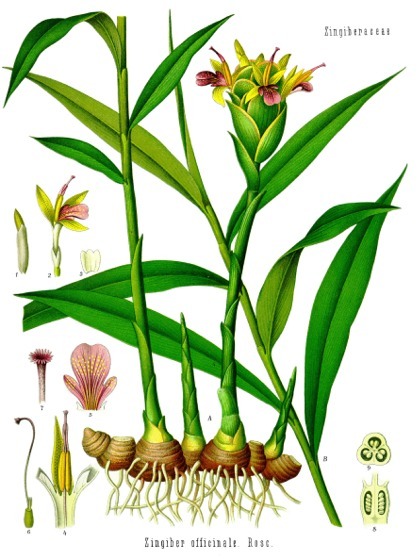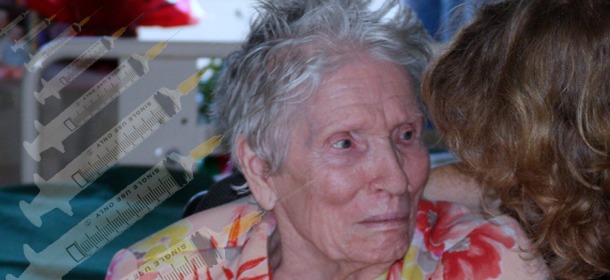Natural Health
Ginger Treats Cancer, Brain Inflammation, Radiation, Staph & Much More!
Not only is ginger a culinary marvel, its health benefits are stunning. It has been shown to be more effective against staph infections than antibiotics—and without the adverse effects.
 Ginger’s culinary qualities are a delight, but its health benefits are simply stunning. It has been shown to be more effective against bacterial staph infections than antibiotics. It can kill cancer cells. Its anti-inflammatory effects are already famous. It can resolve brain inflammations, and ease or cure a variety of gut problems, such as ulcerative colitis and acid reflux. And ginger can even alleviate the effects of gamma radiation. What’s not to love about this incredible herb?
Ginger’s culinary qualities are a delight, but its health benefits are simply stunning. It has been shown to be more effective against bacterial staph infections than antibiotics. It can kill cancer cells. Its anti-inflammatory effects are already famous. It can resolve brain inflammations, and ease or cure a variety of gut problems, such as ulcerative colitis and acid reflux. And ginger can even alleviate the effects of gamma radiation. What’s not to love about this incredible herb?
Standard in many kitchens and cuisines, ginger is the seasoning that gives life to a host of dishes. It’s been used medicinally for more than 2,000 years. Though best known for its gastrointestinal soothing effects, that’s just the beginning of its uses. The plant parts used for both culinary and medicinal purposes are the rhizomes, the root-like stems that grow underground. The primary plant used medicinally is Zingiber officinale.
Several compounds in ginger may be related to its health benefits, including shogaol, zingerone, and gingerols, which are similar to chili pepper’s capsaicin, noted for its pain relieving ability. However, as we’ve seen with separating aspirin from willow bark, trying to find the active ingredient in a herb and using it alone tends to both diminish its effects and remove the balancing components that can both increase positive effects and decrease or eliminate adverse effects.
Some information in this article is derived from studies that have isolated single ingredients, generally with the goal of developing drugs. Though this may be accomplished, a history of pharmaceuticals demonstrates that it is both hubristic to believe that nature will be improved and naive to think that isolating a single chemical can possibly be done without removing the balancing elements that mitigate against harmful effects. Nonetheless, such studies do help demonstrate that there is strong medicine in ginger.
Ginger’s Health Benefits
Let’s take a look at some of the areas that ginger has been shown to benefit health:
- Cancer: Several studies have demonstrated ginger’s ability to defeat several types of cancer cells, including some of the most aggressive and difficult to treat: lung, ovarian, colon, breast, skin carcinoma, prostate, and pancreatic.(1,2,3,4,5,6,7,8)
- Diabetes Prevention: Studies have shown that diabetes may be both prevented and treated, along with the related abilities to lower blood sugar, cholesterol, and blood fats.(9,10)
- Antiobiotic: Ginger’s antibiotic effects may be exceptional. At least one study(10) that compares the effects of ginger and antibiotics on Staphylococcus aureus and S. pyreus infections shows that ginger extract may be superior. The effects on drug-resistant infections are, as yet, unknown. Ginger has been shown to have an antibacterial effect on respiratory and periodontal infections.(11,12,13)
- Antifungal: Fungal infections are among the most difficult to treat, and drug-resistant fungi have been developing. However, there’s no need to despair, as ginger has been found to have antifungal capability, including to drug-resistant forms.(14)
- Ulcers: Intestinal ulcers can be prevented with ginger. There is a generally recognized acceptance now that the Helico pylori bacterium is associated with ulcers, and at least one study has shown that a derivative of ginger has been shown to inhibit H. pylori. One study has demonstrated that ginger can inhibit existing ulcers, too.(15,16)
- Diabetes Complications: Complications of diabetes may be limited by ginger. Studies have shown that it may reduce urine protein levels, decrease water intake and urine output, and reverse proteinuria. It’s been shown to aldose reductase inhibitors, which reduce damage done by diabetes. Ginger can protect nerves in diabetes and lower blood fat levels. (17,18,19,20)
- Inflammation: Inflammation is a serious problem with many chronic conditions, both in terms of causing them and causing pain, and ginger can be highly effective in managing it. Neurodegenerative diseases may be aided by ginger’s ability to inhibit nitrous oxide production and proinflammatory cytokines. Its antiinflammatory ability may be helpful in arthritis, cancer prevention, prostate disease, and general inflammatory processes.(21,22,23,24,25)
- Gastric Distress: Ginger’s ability to ease gastric distress is superior, and it does more than simply ease pain. In a double-blind study, ginger capsules were taken orally in people suffering from dyspepsia with slow emptying of the stomach’s contents. It stimulated the emptying of the stomach without any negative effects. It has been found to have an antispasmodic agent, which helps explain some of its beneficial effects on the intestinal tract. As previously stated, it inhibits H. pylori, which helps prevent ulcers. It also protects gastic mucosa.(26,27,28)
- Toxicity: Ginger helps prevent the toxic effects of a wide array of substances, including the pesticide lindane, a cancer drug, the chemical bromobenzene, and the excitotoxin monosodium glutamate (MSG). Lindane was shown to modulate oxidative stress in rats exposed to the pesticide lindane, a neurotoxin, simply by adding it to their diet. The cancer drug doxorubicin damages kidneys, but ginger has been shown to help alleviate the harm. Brombozene is highly toxic, used in chemical reactions, and can rapidly damage the liver and nervous system. Ginger has been shown to alleviate its liver damage. Ginger extract has been shown to protect against MSG nerve damage.29,30,31,32)
- Nonalcoholic Fatty Liver Disease (Fructose Damage): Nonalcoholic fatty liver disease (NFLD) has a variety of causes, but it’s now on the increase because of the prevalence of fructose as a sweetener. Research on ginger’s function with regard to NFLD is in the very early stages. However, NFLD is known to be associated with dyslipidemia and excess triglycerides in the liver. Ginger may help this condition by lowering serum cholesterol. Research showing this is very new, published just this year, so it’s hardly definitive. However, ginger does appear to hold promise as a treatment for NFLD.(33)
- Heartworms in Dogs: Dirofilaria immitis, heartworms, are a common canine infection. The standard medical treatments are risky, frequently causing neurological disorders and circulatory collapse. Resistance to them is also developing. It’s therefore quite fortunate that ginger has been shown to be effective against heartworms. The treatment that’s been tried is injections of the extract, and it does take time. However, after 55 days, an average 83% reduction, up to a maximum of 98%, was found. About half the dogs exhibited lethargy early in the treatment, but it’s believed to be a result of their bodies’ need to dispose of the worms, as opposed to an adverse effect.(34,35)
- Menstrual Pain: A double blind study of young women suffering from menstrual pain compared with mefenamic acid (a nonsteroidal anti-inflammatory marketed as Ponstel), ibuprofen, ginger powder in capsules, and placebo was performed. Ginger was found to be as effective as both mefenamic acid and ibuprofen.(36)
- Radiation: With radiation in the news lately, it’s wonderful to learn that ginger has been proven to provide significant benefit against it. One study has demonstrated that it can help prevent vomiting and taste distortion associated with radiation poisoning. Another study administered high doses of ginger extract to mice before their exposure to gamma radiation, and compared them to mice that had received only distilled water before exposure. It reduced the severity of symptoms and mortality. They were protected from gastrointestinal and bone-marrow-related deaths. It’s interesting to note that treatment after exposure provided no benefit.(37,38)
- Gout, Rheumatoid Arthritis, Knee Osteoarthritis, and Indomethacin: Indomethacin is an anti-inflammatory drug commonly used to treat the pain from inflammation of gout, rheumatoid arthritis, and osteoarthritis of the knee. Studies comparing the effect of ginger extract with indomethacin consistently show that ginger is, at a minimum, just as effective, and sometimes even more than indomethacin. Since indomethacin’s adverse effects include renal insufficiency in 40% of the people who take it, jaundice in 10%, headaches in 12%, and elevations in liver function tests indicating harm to the liver, plus a host of other nasty problems, it’s difficult to imagine any legitimate reason for doctors prescribing the drug when they could simply have their patients take ginger extract.(39,40,41)
- Nausea and Motion Sickness: Ginger has been well studied for its classic ability to ease nausea in all sorts of situations. It has long been used for motion and sea sickness. Studies have been done both to ascertain whether it’s effective—which, of course, it is—and also to try to figure out how it works. Morning sickness, nausea, during pregnancy causes misery for a lot of women. Women suffering from morning sickness were given beverages with ginger during the first trimester of pregnancy and compared with women given placebo. Ginger alleviated the nausea in a highly significant percentage of the women. A trial of taking ginger and protein after chemotherapy demonstrated that patients were able to lessen their intake of anti-emetic medications.(42,43,44,45)
- Bacterial Diarrhea: The primary cause of death in young children in developing countries is bacterial-induced diarrhea. The bacteria don’t cause it directly. The toxins they release do. Zingerone, a compound found in ginger, binds the toxin so that it cannot interact with the gut, thus preventing diarrhea and the resultant death. The standard treatment now is antibiotics coupled with electrolyte replacement, which would indicate that the antibiotics are not particularly effective. Since the long term effects of antibiotics are now known to be disastrous and antibiotics are expensive, it’s hard to imagine a legitimate reason for not implementing large-scale trials of ginger on children suffering from bacterial diarrhea.(46)
- Other Benefits: The benefits of ginger are amazing, and they don’t stop with the ones listed above. Here, briefly, are a few more that have been studied:
- Post-stroke neurological urinary incontinence can be helped with ginger-salt-partitioned moxibustion.(47)
- Patients with hospital ventilator0induced pneumonia benefit from ginger extract.(48)
- Trigeminal nerve pain is alleviated with a traditional Japanese herbal combination that includes ginger, Saiko-Keishi-To.(49)
- Blood urea nitrogen, the BUN of blood tests, is markedly decreased by ginger extract.(50)
- Cerebral ischemia, small stroke, causes brain damage, including memory loss. Ginger extract significantly reduces damage and alleviates the loss of memory.(51)
- One study demonstrates that ginger extract may help prevent heart attacks.(52)
Astounding, isn’t it? The range and severity of conditions that ginger can help is stunning, and the degree of effectiveness is even more amazing. It’s time for modern medicine to take a step back and ask itself how it got on such a wrong track. When drugs and treatments that are less effective and also full of adverse effects are used instead of first looking to a natural treatment like ginger, then surely a wrong turn has been taken.
Adverse Effects of Ginger
Ginger is almost completely safe. It is possible, though exceedingly rare, to experience an allergic reaction associated with anaphylactic shock. Obviously, if that occurs, you should not attempt to take it again.
Ginger interacts with many drugs. In most cases, the effect is additive, not contradictory. You are told not to take ginger with these drugs—but frankly, one should ask why the doctor doesn’t start with ginger and add the drugs if needed. Here are some of the drugs involved, according to Drugs.com(53):
- Any heart medication.
- Diabetes medications, including insulin, glipizide (Glucotrol), glyburide (Glynase, Diabeta, Micronase), chlorpropamide (Diabinese), tolbutamide (Orinase), tolazamide (Tolinase), troglitazone (Rezulin), rosiglitazone (Avandia), repaglinide (Prandin), metformin (Glucophage), and others.
- Warfarin (coumadin).
- Aspirin or other NSAIDs (non-steroidal anti-inflammatory drugs) such as ibuprofen (Motrin, Advil), diclofenac (Cataflam, Voltaren), etodolac (Lodine), indomethacin (Indocin), meloxicam (Mobic), nabumetone (Relafen), naproxen (Aleve, Naprosyn), piroxicam (Feldene), and others.
- Nonsteroidal anti-inflammatory drug (NSAID) including ibuprofen (Advil, Motrin, Nuprin, others), naproxen (Aleve, Naprosyn, Naprelan, Anaprox, others), ketoprofen (Orudis KT, Orudis), indomethacin (Indocin), etodolac (Lodine), nabumetone (Relafen), oxaprozin (Daypro), piroxicam (Feldene), sulindac (Clinoril), tolmetin (Tolectin), and others
- Blood thinners, usually used for deep vein thrombosis (often during surgeries), including ardeparin (Normiflo), dalteparin (Fragmin), danaparoid (Orgaran), enoxaparin (Lovenox), or heparin.
Of course, if you take other herbs with ginger, be sure to check if they’re blood thinners. If so, you may need to stop either the ginger or the other herb. At least, add one or the other slowly to assure that there are no adverse consequences.
Forms of Ginger
In general, for personal use, there are two forms of ginger: extract and tea. Extracts may be purchased, of course, but be aware that there are two forms of extract, water and alcohol based. With many herbs, water based extracts are fine. However, alcohol based ginger extract has proven to be far superior over and over. Therefore, if you’re planning to use ginger extract medicinally, you should take the alcohol-based variety.
Ginger tea is a treat for many of us. You can buy ginger teas in tea bags, but they’re generally not as beneficial as making your own. It’s not difficult. Just follow these instructions:
Peel about a cubic inch of ginger. You may either slice it thinly or grate it. Boil it in about 1½ cups of water for about 10 minutes. If you wish, you could add a bit of lime or lemon juice. If you want it sweetened, add some honey or stevia. Pour into a cup and enjoy!
Everyone’s taste is different. This is a starting point. Use more or less ginger as suits you.
Sources:
- (1)Histone deacetylase inhibitors from the rhizomes of Zingiber zerumbet.
- (2)[6]-Gingerol induces reactive oxygen species regulated mitochondrial cell death pathway in human epidermoid carcinoma A431 cells.
- (3)[6]-Gingerol inhibits metastasis of MDA-MB-231 human breast cancer cells
- (4)Zerumbone, a tropical ginger sesquiterpene, inhibits colon and lung carcinogenesis in mice
- (5)Ginger Extract Inhibits Human Telomerase Reverse Transcriptase and c-Myc Expression in A549 Lung Cancer Cells
- (6)[6]-Gingerol induces cell cycle arrest and cell death of mutant p53-expressing pancreatic cancer cells.
- (7)Ginger Kills Ovarian Cancer Cells
- (8)In vitro and in vivo modulation of testosterone mediated alterations in apoptosis related proteins by [6]-gingerol.
- (9)Inhibitory effects of Zingiber officinale Roscoe derived components on aldose reductase activity in vitro and in vivo.
- (10)Anti-diabetic and hypolipidaemic properties of ginger (Zingiber officinale) in streptozotocin-induced diabetic rats.
- (11)Comparative studies of antibacterial effect of some antibiotics and ginger (Zingiber officinale) on two pathogenic bacteria
- (12)Antibacterial effect of Zingiber officinale and Garcinia kola on respiratory tract pathogens.
- (13)Antibacterial activity of [10]-gingerol and [12]-gingerol isolated from ginger rhizome against periodontal bacteria.
- (14)Inhibition of human pathogenic fungi by ethnobotanically selected plant extracts.
- (15)Inhibition of gastric H+, K+-ATPase and Helicobacter pylori growth by phenolic antioxidants of Zingiber officinale.
- (16)The anti-ulcer effect in rats of ginger constituents.
- (17)Anti-diabetic and hypolipidaemic properties of ginger (Zingiber officinale) in streptozotocin-induced diabetic rats.
- (18)Inhibitory effects of Zingiber officinale Roscoe derived components on aldose reductase activity in vitro and in vivo.
- (19)Effect of ethanolic extract of Zingiber officinale on dyslipidaemia in diabetic rats.
- (20)Neuroprotective effect of ginger on anti-oxidant enzymes in streptozotocin-induced diabetic rats.
- (21)Hexane fraction of Zingiberis Rhizoma Crudus extract inhibits the production of nitric oxide and proinflammatory cytokines in LPS-stimulated BV2 microglial cells via the NF-kappaB pathway
- (22)6-Shogaol inhibits monosodium urate crystal-induced inflammation – An in vivo and in vitro study
- (23)6-Gingerol inhibits ROS and iNOS through the suppression of PKC-α and NF-κB pathways in lipopolysaccharide-stimulated mouse macrophages
- (24)Ginger—An Herbal Medicinal Product with Broad Anti-Inflammatory Actions
- (25)Chemopreventive anti-inflammatory activities of curcumin and other phytochemicals mediated by MAP kinase phosphatase-5 in prostate cells
- (26)Effect of ginger on gastric motility and symptoms of functional dyspepsia
- (27)Pharmacological basis for the medicinal use of ginger in gastrointestinal disorders.
- (28)Gastroprotective Effect of Ginger Rhizome (Zingiber officinale) Extract: Role of Gallic Acid and Cinnamic Acid in H+, K+-ATPase/H. pylori Inhibition and Anti-Oxidative Mechanism
- (29)Protective effects of dietary ginger (Zingiber officinales Rosc.) on lindane-induced oxidative stress in rats
- (30)Protective effect of Zingiber officinale roscoe against anticancer drug doxorubicin-induced acute nephrotoxicity.
- (31)Protective effect of ginger extract against bromobenzene-induced hepatotoxicity in male rats.
- (32)Neuroprotective evaluation of extract of ginger (Zingiber officinale) root in monosodium glutamate-induced toxicity in different brain areas male albino rats.
- (33)Potential efficacy of ginger as a natural supplement for nonalcoholic fatty liver disease
- (34)Screening of microfilaricidal effects of plant extracts against Dirofilaria immitis
- (35)Antifilarial effect of Zingiber officinale on Dirofilaria immitis.
- (36)Comparison of effects of ginger, mefenamic acid, and ibuprofen on pain in women with primary dysmenorrhea.
- (37)Ginger (Zingiber officinale Rosc.), a dietary supplement, protects mice against radiation-induced lethality: mechanism of action.
- (38)Zingiber officinale exhibits behavioral radioprotection against radiation-induced CTA in a gender-specific manner.
- (39)6-Shogaol inhibits monosodium urate crystal-induced inflammation–an in vivo and in vitro study.
- (40)Effects of ginger on primary knee osteoarthritis
- (41)Evaluation of the effect of hydroalcoholic extract of Zingiber officinale rhizomes in rat collagen-induced arthritis.
- (42)Ginger root against seasickness. A controlled trial on the open sea.
- (43)Effects of ginger on motion sickness and gastric slow-wave dysrhythmias induced by
- (44)Ginger syrup as an antiemetic in early pregnancy.
- (45)Protein and ginger for the treatment of chemotherapy-induced delayed nausea.
- (46)Herbal medicine’s secret exposed
- (47)Randomized controlled study on ginger-salt-partitioned moxibustion at shenque (CV 8) on urination disorders poststroke
- (48)Ginger extract reduces delayed gastric emptying and nosocomial pneumonia in adult respiratory distress syndrome patients hospitalized in an intensive care unit.
- (49)Effectiveness of Saiko-Keishi-To (TJ-10, a Kampo herbal medicine) for trigeminal neuralgia in rats
- (50)The effect of ginger extract on blood urea nitrogen and creatinine in mice.
- (51)Zingiber officinale Mitigates Brain Damage and Improves Memory Impairment in Focal Cerebral Ischemic Rat
- (52)Aqueous extracts of onion, garlic and ginger inhibit platelet aggregation and alter arachidonic acid metabolism.
- (53)Ginger(Drugs.com reference)
- Ginger ‘may fight ovarian cancer’
- Ginger ‘could halt bowel cancer’
- Health News: Ginger could cut ulcer risk, a new vaccine could protect against MRSA and could a dose of zinc silence tinnitus?
- Ginger (University of Maryland Medical Center Reference)
- Ginger has painkilling properties: research
Tagged alternative medicine, ginger, ginger antibiotic, ginger antifungal, ginger cancer, ginger diabetes, ginger diarrhea, ginger fructose damage, ginger gastric distress, ginger gout, ginger health benefits, ginger heartworms, ginger inflammation, ginger menstrual pain, ginger motion sickness, ginger msg, ginger msg damage, ginger nausea, ginger nonalcoholic fatty liver disease, ginger radiation, ginger rheumatoid arthritis, ginger toxicity, ginger ulcer, ginger upset stomach, gingerols, natural health, natural medicine, shogaol, zingerone














Pingback: #Ginger is a #NaturalRemedy for #Inflammation http… | lanavate.com
Pingback: Homemade Gingerale | Mooley & Me
Pingback: Ultimate brain food – Increase memory, reduce the risk of Alzheimer’s and protect against multiple sclerosis with ginger | Natural Guru
Pingback: Jewish Watch Australia » Ultimate brain food – Increase memory, reduce the risk of Alzheimer’s and protect against multiple sclerosis with ginger
Pingback: Recipe: Carrot Ginger Soup | The Running Carrot
Pingback: Recipe: Carrot Ginger Soup – Mindful Meals